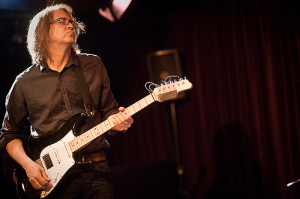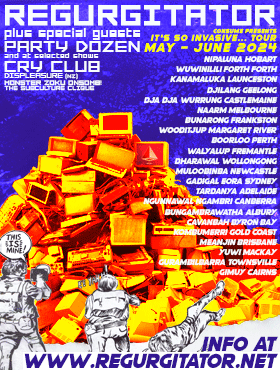WAYNE KRANTZ, TAL WILKENFELD, KEITH CARLOCK TOUR CHAT
October 28, 2008 | Author:Greg Phillips
 When a player comes to our attention, not through radio, television nor even your regular music retail outlets, but through sheer reputation … you have to sit up and take notice. New York based guitarist Wayne Krantz’s eminence among the world’s musician community has come about gradually and organically, largely stemming from a famous ten year residency at NYC’s 55 Bar, and the wonderful recordings of those gigs which have been available via Wayne’s website. Certainly Krantz has played with some heavy hitters in the music game such as Steely Dan, Michael Brecker and Billy Cobham, but it’s his solo guitar work and his novel approach to music which has set him apart from your regular guitar maestro. The fluidity of his fretwork and imperceptible note choices have gained the staunchly independent Krantz a reputation as one of the world’s most distinctive musicians. As to what Australian audiences can expect from shows when the super trio arrives in late October, I asked the man himself!
When a player comes to our attention, not through radio, television nor even your regular music retail outlets, but through sheer reputation … you have to sit up and take notice. New York based guitarist Wayne Krantz’s eminence among the world’s musician community has come about gradually and organically, largely stemming from a famous ten year residency at NYC’s 55 Bar, and the wonderful recordings of those gigs which have been available via Wayne’s website. Certainly Krantz has played with some heavy hitters in the music game such as Steely Dan, Michael Brecker and Billy Cobham, but it’s his solo guitar work and his novel approach to music which has set him apart from your regular guitar maestro. The fluidity of his fretwork and imperceptible note choices have gained the staunchly independent Krantz a reputation as one of the world’s most distinctive musicians. As to what Australian audiences can expect from shows when the super trio arrives in late October, I asked the man himself!
“Spontaneous, energetic, groovy, and as creative as we’re capable of making it on any given day.”
What does playing with such amazing musicians as Tal and Keith mean for you as a player in a live situation?
That I can worry less about the thing lifting off. When the players can facilitate that, it has a chance to explode like it should. Otherwise it feels like a wasted opportunity. I hate leaving the stage with that feeling.
Playing the type of free form music that you do, I’m interested to know what kind of rehearsal/warm up regime you’ll undertake with Tal and Keith for this tour?
We’ll rehearse as much as we can, given everybody’s schedule. There is a lot of freedom in the music, but the approach is actually pretty organised. Most of the people I play with these days are already familiar with it, but it can take some time to plug back into it. Like if they’ve spent the last 2 weeks playing with Shakira or something!
How does an audience’s reaction feed into your music? Can an enthusiastic crowd change the way you play?
Everything changes the way I play. I used to think that was a weakness, but I’ve come to respect it. It’s improvisation, after all. Beyond that it would be tough to find a performer who doesn’t appreciate and feed off an enthusiastic audience. But not everyone expresses enthusiasm in obvious ways.
Some musicians see their gear as merely tools to convey their music, whereas others are constantly exploring new gear to the point of obsession. Where do you fit in?
The “tool” category. Doesn’t exactly bring in the big endorsement opportunities, but what can I say?
In one of your answers to a fan’s question on your site, you mentioned that you got a lot from James Brown. Were you being serious? If so, how did James influence you?
I think I was talking about the cues I use with the band to direct the improvising. That concept has existed in Rn’B and jazz for a long time, though I’d like to think we’ve broken a little ground with it here and there. Mr. Brown was also heavily into rhythmic counterpoint, as was Sly Stone after him. I’m just giving credit where it’s due; I didn’t study those guys particularly to get into some of those same things. Herbie Hancock probably had a more direct impact on me, rhythmically.
Is there a moment in your musical career that you look at as being pivotal?
There are countless moments on the musical side. As far as career/business, not so many. I guess I’d have to say that playing with Leni Stern in the late ’80s was pivotal in that it introduced me to bass players and drummers that I would go on to play with in my own bands. And it plugged me into the New York scene as a sideman. And it led to my first and only record deal, with Enja.
You have said that you get bored with what you did years, months and sometimes days ago. What about listening to music for enjoyment. Are there albums that you can play over and over again and still enjoy?
I usually answer this by saying that I haven’t listened to music since 1985. It’s basically true, as far as listening to stuff again and again. I stopped because I couldn’t get other people’s music out of my head long enough to see if I had anything of my own in there. Then I got out of the habit. Then I couldn’t afford it. Then I was disappointed when I tried to. I don’t go to recorded music for inspiration like I used to. I do like to hear people play live, though. Performance is amazing to me. Beyond even whether it’s good or not, it’s moving. As any loving act is.
When recording your own material, are you as ‘in the moment’ as you are playing live or do you become more meticulous?
Sometimes I’m even more in the moment in the studio because there are fewer distractions. But yeah, being able to redo stuff can make it more self-conscious and meticulous, and the music can suffer. But as with everything, it’s about the artistry you bring to it.
What shows have you been to where a musician has really blown you away?
Sons of Champlin, around 1974, somewhere outside on a sunny day in Oregon. Terry Haggerty played a solo that I still think about sometimes, the feeling of it at least. I remember being shocked by a Mahavishnu Orchestra concert a little later. And a George Benson gig in some little club a few years after that, right before ‘Breezin’’. All guitar shows, I just realised … and all a million years ago. Maybe I was more open then. Art is invasive, you know. The trick is to let your defences down, to allow the invasion. Why not?
I’m always interested to know what else a creative person is into and where they draw inspiration from. Are there any particular painters, film makers, dancers, singers that inspire your music?
I like painters, mostly modern but other stuff too. I like architecture. Literature too, but it doesn’t usually inspire me like the visual stuff does for some reason. Maybe the visual things are more directly connected to nature.
You played live with Steely Dan, how much freedom were you given within the parameters of the songs?
A reasonable amount. There were certain things that had to be there, but they wanted a lot of improvising in the solos, at least at the time I did it. But they didn’t want the band to interact with it ’cause they thought it would interrupt the groove for the audience. That was a challenge. Interaction is usually crucial for me. I had fun anyway.
Playing with some of the great musicians that you have, what kind of things have you learned?
Oh God. A lot about playing, about being a musician in the world, being a man, being a person…I read something Vernon Reid said once to the effect that music is a hard way to learn about yourself, but a good way. Maybe I could have gotten to a lot of that by myself in a room somewhere, but playing with good people can give you some shortcuts.
You’ve had a regular gig at New York’s 55 Bar for a long time. In what ways has the city of New York effected your music?
It attracts the kind of musicians I tend to like playing with. It still has a kind of artistic aesthetic that works for me, though sometimes I wonder if I’m kidding myself with that. The sheer scale of it and all that colourful, evocative, funky detail can take your breath away, which sets you up creatively. It’s relatively no-nonsense, loud, fast and energetic. Like the music.
You seem to treat music almost as a science. Would that be a fair comment?
I’ve been pretty scientific with my study of music, yeah. I like music theory, I like being really specific and focused as a practice. But in terms of actually playing and writing music, not so much. I write by ear, and when I play I’m mainly just trying to connect with the energy as completely as I can. I understand what people mean when they talk about the mathematics of music, but I don’t feel it that way. I don’t think many musicians or audiences do.
Did you enjoy the process involved in writing your book, ‘An Improviser’s OS’?
No. It took ten years, for one thing. But as with writing music, when it finally started to flow it was a good feeling. I enjoyed finishing it.
You are strongly independent in your approach to your music. The major record companies are in trouble due to decreasing CD sales and the increase in free downloads, both legal and illegal. How do you see (or hope to see) the whole music distribution thing going in the future?
It seems like everything will just be one big commercial, with art attached to get consumers to sit through it. Whatever happens, I think performance will still exist and that’s all I really care about. Even now it’s not as it was or will be, but people are still getting every bit as inspired, I think. Music is fundamental, however it’s transmitted.
What are you looking forward to most about your Australian trip?
It’s been a long time since I’ve set foot on an unfamiliar continent. Looking forward to seeing the culture on its own turf. It always seems like the Australians I meet can really play – James Muller is amazing, Tal, Sean Weyland, Joe Chindamo, Marc Hannaford … and I know there’s a bunch more. Obviously music is taken seriously down there, so it’ll be fun to play. And hang out, if there’s any time, which there probably won’t be. I’m glad this tour is finally coming together. I tried to get it happening for years, but we were never famous enough. Now at least the bass player and drummer are famous, so I can get a gig!


